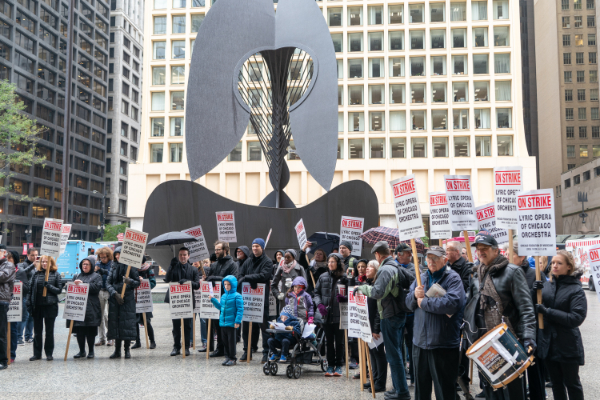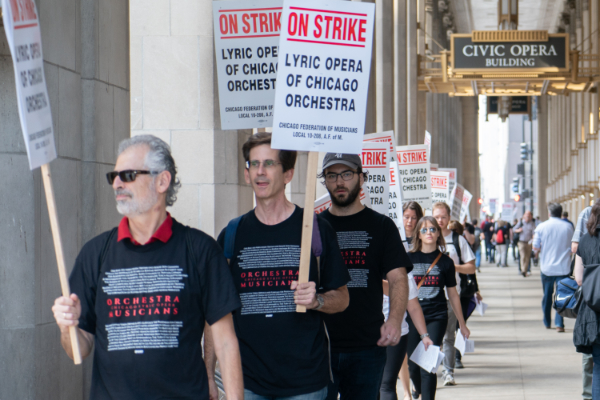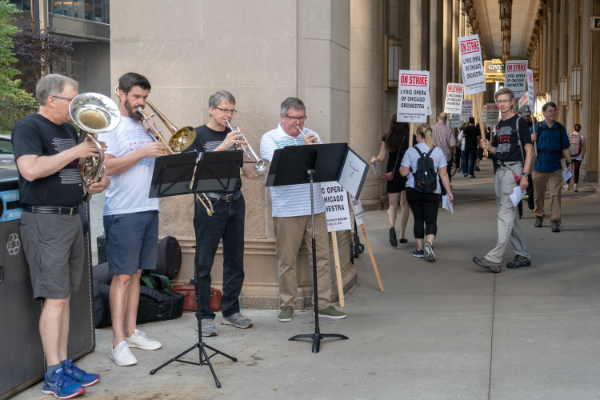
Photo credit: Lucy Wang
On the morning of October 9, just days after my first opening night as a tenured member of the Chicago Lyric Opera Orchestra, I found myself outside on the first picket line in my orchestra’s 65-year history.
More than a year before this, Lyric had held its first-ever scheduled all-company meeting. To their audience of hundreds of employees—orchestra musicians, chorus members, stagehands, costumers, support staff—management spelled out what it called “the facts”. Subscription rates were falling, tickets were harder to sell, and donors were tired of giving to an institution whose financial house was not in order. The clear subtext was that management planned to seek concessions in all the union contracts, trying to improve its finances on the backs of the artists and craftspeople of the company who create the great opera for which Lyric is world-renowned. When we began bargaining, that is exactly what Lyric demanded: major cuts to the size of the orchestra and the number of guaranteed weeks of the season (and thus a reduction in our annual salary of up to 43%).
We see different facts.
Our nightly audience is averaging 84% of our house’s unusually large capacity of over 3,500, and ticket revenue has increased since 2012. Both of these have occurred despite increasing obstacles to patrons. Management itself has admitted it was slow to adapt to new technology. (You couldn’t even buy a ticket on your phone until recently!) Countless audience members have complained of dysfunction in the online ticketing systems—despite Lyric having spent more than $1 million to develop its buggy website—and of difficulty in getting help over the phone. Others have expressed their frustration with Lyric’s recalcitrance when trying to exchange tickets or choose different subscription nights.

Lyric Opera Orchestra members and supporters rally in Daley Plaza
Photo credit: Del Hall
Over the past decade, management has reduced the number of performances drastically, depriving patrons of the flexibility to find time in their schedules to see opera. We have heard from countless subscribers who simply stopped coming to the opera because Lyric took away their longstanding subscription nights. Not long ago, our season had over 90 performances; this season, management scheduled 56 performances—and only four performances of Wagner’s Siegfried! Worse, Lyric management informed us last spring that it would immediately be canceling our opening-night radio broadcasts and spring re-broadcasts, further limiting our reach to opera lovers across the country and the world and delivering a huge blow to our audience development.
To the extent Lyric faces financial challenges, we see a different reason for that than the costs of the orchestra. Lyric increased its budget by $24 million—from $60 million to $84 million—since General Director Anthony Freud arrived in 2012. Over that time, the percentage of that budget going to total orchestra costs decreased from 14.6% to 11.9%. It is clear to us that targeting the orchestra is not the solution to management’s budgetary concerns.
It was obvious to me and the rest of the orchestra that this strike was not just about the orchestra musicians’ terms and conditions of employment. This strike was about a principle. For the past 65 years, Chicago’s citizens, civic leaders, and philanthropists have built a world-class opera company for a world-class city. Our orchestra has been a key part of that, renowned for our artistry and sound and performing for every production our company has presented. The cuts that Lyric management demanded would decimate the orchestra and forever diminish the Lyric Opera of Chicago as a crown jewel in the cultural life of Chicago and the opera world as a whole.

Alexander Belavsky, Mark Brandfonbrener, and Paul Dwyer walking the picket line with colleaguesPhoto credit: Del Hall
From the minute we went on strike on a Tuesday morning, we were hit by a wave of public support that we could never have expected. Patrons and donors came up to us on the picket line to express their support for our cause. They raved about our beautiful sound, production after production, and decried the cuts management was making to the number of performances and to the radio broadcasts. Messages came in through social media from all corners of the globe, demanding that management take back their cuts to our weeks of work and number of musicians. We were joined on the picket line by friends, family, retirees, students, music lovers, union brothers and sisters, and even neighbors who work in the office portion of the opera building. Brass ensembles serenaded commuters on the street corner beside the ever-plentiful pile of water, sandwich trays, and baked goods that were donated to the cause. Our assigned police officer told us his mother had been a music teacher and enjoyed the beautiful music.

Mark Fisher, Jeremy Moeller, Channing Philbrick, and Matthew Lee perform on the picket line
Photo credit: Del Hall
Negotiations continued during the strike, and on Sunday, five days after the strike began, the orchestra ratified an agreement. During an orchestra meeting that took most of the afternoon, we learned that management was so set in its myopic, defeatist view that it was willing to immediately cancel productions, the whole season, and the Ring Cycle scheduled for 2019–2020. Management seemed entirely willing even to go into bankruptcy. The terms of the agreement were better than what had been offered before the strike—and were certainly far better than the initial draconian cuts Lyric was demanding—but were still highly concessionary. After lengthy discussion, where all members who wished to speak shared their thoughts, the orchestra voted to ratify.
We will never know what would have been the alternative to that decision. If we had remained on strike, would we have been able to sustain our claim that we were fighting to preserve grand opera if it collapsed around us? Would we have been able to resist the pressure we were increasingly getting from Lyric’s other unions, who had settled their contracts before we struck? Would public pressure in our favor have become so great that management would have been forced to rethink their terrible plan of shrinking rather than growing?
What we do know is that the orchestra has not given up. We will keep working and finding ways to counter the destructive plan of our short-sighted management. Throughout this whole process, I have seen the orchestra’s passion and dedication crystallize into a clear mission to preserve and protect the Lyric Opera of Chicago. We are eager to find positive ways forward to ensure that we provide Chicago and the world with the highest quality grand opera. We are confident that patrons, donors, and the people of Chicago are ready to stand with us as we continue to work to convince management that our company deserves growth, not withdrawal. We vow to fight for Lyric’s stated vision: “To be the great North American opera company for the twenty-first century.”
Note: The author is the Chicago Lyric Opera Orchestra ICSOM Delegate.





